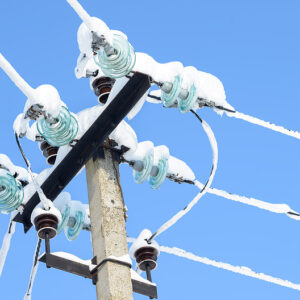Consumer Advocate Warns: Your Electric Bill Could Balloon by 50 Percent

Already paying some of the highest energy costs in the country, New Hampshire ratepayers will soon be paying a lot more.
According to a filing with the Public Utilities Commission, Liberty Utilities is seeking approval for an increase in the default residential energy rate from 8.393 cents per kilowatt-hours to 22.223 cents per kilowatt-hours.
Donald Kreis, with New Hampshire’s Office of Consumer Advocate, said the net effect of the charge will be that Granite Staters who use Liberty can expect to pay nearly 50 percent more for electricity when the new rate goes into effect in August.
“That means a typical bill for a residential electric customer of Liberty Utilities will go up by nearly 47 percent from its current level,” Kreis said on Twitter.
Granite Staters already pay the seventh-highest residential electricity rates in the nation.
Liberty has about 43,000 electric customers in New Hampshire. Kreis said Eversource, New Hampshire’s main electric supplier, is expected to file for a similar rate increase before the PUC soon.
“To my knowledge, these huge default service prices are unprecedented since NH broke up its vertically integrated electric utilities more than 20 years ago,” he wrote on Twitter.
He said on Twitter the reason for the rate increases is the rising cost of natural gas, which electric supplies use to generate the power needed.
“In New England, we rely on natural gas for the majority of our electricity. Natural gas futures prices for the coming winter have hit $30 per mmBTU. Wholesale electric suppliers have priced those natural gas increases into their bids,” he wrote.
Reached Wednesday, Kreis said New Hampshire doe not have a robust natural gas market for homeowners, the state uses a lot of natural gas to fuel power plants, like the Granite Ridge power facility in Londonderry.
Unitil, one of the state’s two other electric utilities, has rates currently at around 10.3 cents per kilowatt-hour and is on a different rate schedule than the other two companies. New Hampshire Electric Cooperative, the second-largest utility in the state, expects to adjust its power supply rate later this summer.
“It’s safe to say that we’re seeing the same dynamics playing out in the New England electric wholesale market. Costs for summer supply are up dramatically from last year, driven primarily by huge increases in the price of natural gas, which is used to generate about half of the power in New England,” said NHEC Communications Administrator Seth Wheeler.
The rate increases coming from Liberty and Eversource far outpace predictions from the U.S. Energy Information Administration. The winter electricity forecast saw a price rise in New England closer to 16 percent, not 47 percent.
“We expect the summer increases in retail residential electricity prices will range from an increase of 2.4 percent in the West South-Central region to a 16.1 percent increase in New England,” the EIA forecast states.
Kreis said utilities buy power from suppliers in six-month increments, and the rate increases reflect the increased prices they are paying for power under the new six-month contracts, which will start in August. There won’t be another chance to change the rates until next year, meaning prices will remain high until 2023.
New Hampshire’s elected officials have taken note.
On Wednesday, Gov. Chris Sununu and Department of Energy Commissioner Jared Chicoine announced that, for the first time ever, the state plans to use Low Income Home Energy Assistance Program (LIHEAP) funding to help struggling households pay for summer electricity costs. The funding will be routed through the New Hampshire Fuel Assistance Program for pre-qualified, low-income households.
“We are allocating $7.5 million in funds to provide low-income families with assistance to help cool their homes this summer,” said Governor Chris Sununu. “As a result of unprecedented Washington spending that has unleashed record inflation, uncertainty in the energy market following President Biden’s anti-domestic energy policies, and the ongoing conflict in Ukraine, energy prices are skyrocketing across the country. While there is not much that states can do to rebuff federal inaction, we are doing what we can at the state level to ease the burden on low-income families.”
Details of the plan, including the exact amount of funding available per family, are still being developed.
“The Department of Energy is working diligently with stakeholders to provide summer electric bill assistance to currently-eligible LIHEAP customers,” said Department of Energy Commissioner Jared Chicoine. “We are hopeful that this assistance will help provide some relief to consumers in these challenging times.”
Kreis said in the short term consumers should shop around for competitive electric suppliers and lobby their municipalities to enter into power aggregation deals to lower the costs. They can also apply for the state’s energy efficiency programs.
New Hampshire energy consumers are looking at a tough winter ahead, too. Home heating oil is selling for close to $6 a gallon, up from about $4.50 a gallon average this past winter, and $3 a gallon from the prior season. Relief is a long way off, as the EIA expects the 2023 winter season to see heating oil back down to under $4 a gallon.
Craig Stevens, a spokesman with the energy and business coalition, Grow America’s Infrastructure Now, said Democratic environmental and energy policies, like restricting domestic energy production, have pushed prices higher.
“The rise in electricity prices is, unfortunately, much too predictable considering the energy policies of the past two Democratic administrations promised – and have since delivered – Americans. Between Presidents Obama and Biden, they have forced the shuttering of power plants across the country, made the siting and construction of transmission lines virtually impossible, stopped pipeline expansion, and closed off domestic energy production,” Stevens said.
“We need more than vapid rhetoric, empty promises, and finger-pointing; we need a comprehensive – all of the above – energy policy that recognizes our current energy needs and the growing energy needs of our increasingly electrified economy.”
With prices likely to remain high through to next year, Kreis said New Hampshire ultimately needs to diversify how it generates power in order to avoid another year like 2022.




